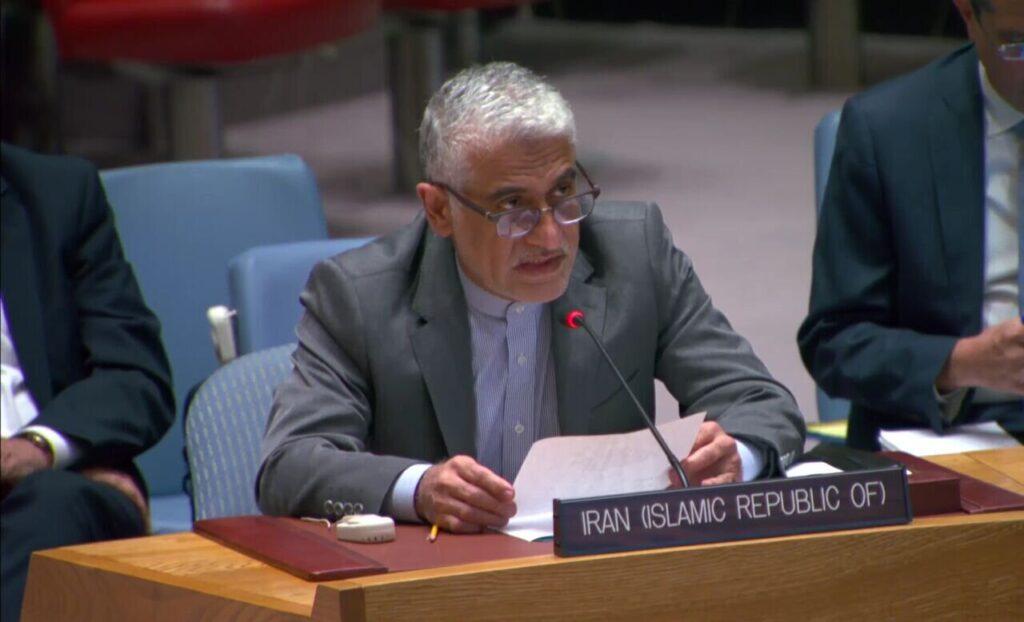Amir Said Irabani, ambassador and permanent representative of the United Nations, announced that Iran and the International Atomic Energy Agency (IAEA) are working on long-term cooperation. Cooperation that could lead to the resolution of the remaining differences between the parties if foreign political pressure on the IAEA is removed and institutions adopt an independent, technical, equitable, and professional approach.
Here is the full text of Irabani’s speech at the UN session:
Statement by
He is Amir Said Irabani
Ambassador and permanent representative
Iran’s Islamic Republic to the United Nations
In front of the United Nations Disarmament Committee
New York, April 8, 2025
In the name of God, the most compassionate and most merciful
Chair,
First, congratulate them on their election as the chair of the substantive committee in 2025 and vice-chair of the working group on their assumptions and chair.
My delegation thanked the competent leadership of Ambassador Usman Jadoon, Pakistan’s resignation chair, and is ready to fully cooperate with you during the current substantive session of UNDC.
In cooperation with the Non-Alliance Movement Statement provided by Indonesia, we would like to make the following statement in the competence of the state:
Chair,
The international community has witnessed a troubling worsening of global peace and security driven by the growing geopolitical competition, the unidentified spread of armed conflict, record global military spending, and the continued presence of over 12,000 nuclear weapons in national equity.
Rather than seeking diplomatic solutions based on international law and multilateralism, we are increasingly seeing them relying on the use of force or threats, foreign military intervention, unilateral enforcement measures and political intimidation.
Chair,
The sustained lack of compliance with existing commitments by nuclear weapon states remains a major policy obstacle that has long hampered meaningful progress within disarmament machines.
We highlight the important role of the United Nations Disarmament Committee (UNDC) in strengthening and advancement of international disarmament, particularly in the field of nuclear disarmament. The UNDC has not provided consensus recommendations on nuclear disarmament for a considerable period of time, thus highlighting the urgent need for concrete progress in Working Group 1 during the current cycle. We call the Nuclear Weapons States (NWS) and demonstrate the political will and flexibility needed to move forward. In this context, it emphasizes the position that the use of rolling text within UNDC is essential to fostering consensus building.
Chair,
Nuclear weapon countries have not only failed to fulfill their disarmament obligations, but are actively pursuing the renewal and modernization of nuclear weapons.
On February 19, 2025, the United States launched the Intercontinental Ballistic Missile (ICBM) to demonstrate the preparation and effectiveness of the US nuclear deterrent. These developments underscore awkward trends among nuclear weapon states towards qualitative and quantitative improvements in weapons, strictly rebelliously against the mandate of disarming.
In particular, the stance of NATO members continues to demand non-proliferation from others while maintaining and relying on nuclear weapons themselves. Currently, five NATO countries are holding US nuclear weapons on the soil. Additionally, more than 40 countries rely on the US expansion nuclear deterrence policy.
These actions are directly inconsistent with legally binding obligations based on commitments made at NPT and its review meetings. Despite these violations, some of these states continue to level out allegations of unfounded basis and politically motivating for Iran’s peaceful nuclear program.
Chair,
Iran is committed to the NPT and I would like to emphasize that it will work constructively with the IAEA to ensure transparency and compliance with its protection agreements. To that end, Iran allows large IAEA tests, which amount to 22% of all IAEA tests. This level of testing has never been performed in any previous country in history.
Iran and the institution have been working together for a long time. This will halt external political pressure on the institution and allow the remaining few differences to be resolved, provided that the IAEA adopts an independent, technical, fair and professional approach.
Chair,
With 60 years of deception and secret WMD Arsenal, the Israeli government, the sole owner of the Middle East, enjoys US support and is consistently opposed to establishing a nuclear-distance zone in the Middle East, including Iran’s proposals since 1974.
To demonstrate a true commitment to the complete elimination of nuclear weapons, the international community must address this obvious exception and force Israel to do so. Israel is an outlaw regime that mistakenly threatened nuclear annihilation in order to falsely condemn the nuclear annihilation, and has joined the NPT, acquired nuclear weapons and is active.
Chair,
New technologies have contributed significantly to global social and economic development, but they should not become monopolies in a small number of countries. Furthermore, the possible meaning of these technologies in the international security context should not be used as an excuse to impose parallel export control regimes or unilateral enforcement measures that violate the inevitable rights of the state in order to access and benefit such technologies.
We will reiterate an unwavering position in steady against the weaponization of emerging technologies and support the peaceful use of them alone through legally binding international agreements.
Thank you to the chair
MP/IRN

